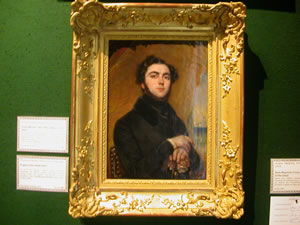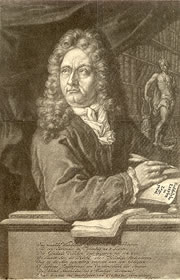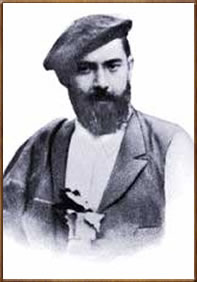De Duitse dichter en schrijver Rudolf Alexander Schröder werd geboren op 26 januari 1878 in Bremen. Zie ook mijn blog van 26 januari 2007 en ook mijn blog van 26 januari 2008 en ook mijn blog van 26 januari 2009.
Mild von Honig
Mild von Honig
flogen Bienen
durchs Gesträuche,
mild von Liedern
flogen Vögel
auf durchs Grün.
Mild von Düften
blühten Blumen
im Gesträuche;
mild von Liebe
sah ich deine
Augen blühn.
Hohe, feierliche Nacht
Hohe, feierliche Nacht,
unbegreifliches Gepränge,
Aug, das über unsrer Enge
fragend in der Fremde wacht.
Hohe, feierliche Nacht!
Goldne Schrift am Firmament,
ach, wer deutet uns im Blauen,
was wir nur durch Tränen schauen,
was so fern, so selig brennt.
Goldne Schrift am Firmament!
Dunkler Saal voll Sphärenklang.
Taub vom Lärm des eignen Lebens
hört das dumpfe Ohr vergebens
deines Lichtes Lobgesang.
Dunkler Saal voll Sphärenklang!
Holde Nacht, von Sternen klar,
spende Trost, dem Trost mag werden
überm Elend aller Erden,
Wunder, ewig wunderbar.
Holde Nacht, von Sternen klar.

Rudolf Alexander Schröder (26 januari 1878 – 22 augustus 1962)
De Duitse dichter, schrijver en journalist Alfons Paquet werd geboren op 26 januari 1881 in Wiesbaden. Zie ook mijn blog van 26 januari 2009.
Uit: Held Namenlos
Auf ihren Ochsen sind mir die Männer entgegengeritten
In roten Mänteln, mit der kosmischen Gastlichkeit ihrer Welt;
Auf alten Grabhügeln saßen wir inmitten,
Und ihre Weiber entkleideten zum Geschenk sich im Zelt.
Im stürmenden Sande grunzte die Karawane,
Die Tiere fielen vor Hunger, erstickten in des Fußbodens grauem Schleim;
In der Sandwüste ein Schädel, nur gehütet von einer kleinen Fahne,
Modert, und rollt den Abhang hinab, als wollte er dennoch heim.
Nicht eine Erbse von Silber gab ich für die Seide der ellenlangen
Köstlichen Fahnen, mit indischen Göttern und Regenbogen bestickt,
Die auf den Steinhaufen der Hochpässe als Opfer hangen,
Mit Pferdehaaren, mit gebleichten Schafsschulterblättern geschmückt.
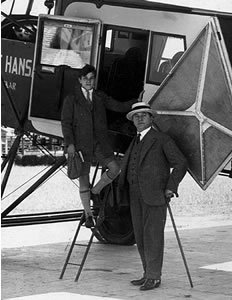
Alfons Paquet (26 januari 1881 – 8 februari 1944)
Vliegveld Frankfurt Rebstock met zoon Sebastian ca. 1925
De Vlaamse schrijver Lode Baekelmans werd geboren in Antwerpen op 26 januari 1879. Hij schreef heel wat volkse verhalen met het Antwerpse schippersmilieu als decor. Tot zijn bekendste romans behoren Tille, Mijnheer Snepvangers en Het rad van avontuur. Daarnaast was hij professioneel actief eerst als stadsbediende waar hij doorgroeide tot de functie van Antwerps hoofdbibliothecaris. Hij was medestichter van het Archief en Museum voor het Vlaamse Cultuurleven en de Vlaamse Vereniging voor Bibliotheekwezen en geruime tijd voorzitter van de Vereniging van Vlaamse Letterkundigen. Verder was hij ook leerkracht en initiatiefnemer en redacteur bij Alvoorder.
Uit: Cyriel Buysse
„Er zijn schrijvers, wier werk slechts langzaam erkenning vindt. Zij moeten met geduld en zelfvertrouwen gewapend zijn. Zoo iemand was Cyriel Buysse, die in Vlaanderen nog zeer lang meer afwijzing dan waardeering ondervond, toen hij integendeel reeds lang in Holland onder de gevierde auteurs werd gerekend. Bij het aanbreken van zijn levensavond, toen zijn zeventigste verjaardag gevierd werd, was hij verzoend met al de Vlamingen, werd zijn werk gelezen en zijn schrijversfiguur met eerbied begroet.
Buysse, die zijn volk en zijn land hartstochtelijk liefhad, was een waarheidlievend mensch, die enkel de werkelijkheid wou en kon uitbeelden. De spiegel, dien hij voorhield, weerkaatste figuren en toestanden die velen tijdgenooten tegenstonden, maar vooral ontstemming verwekten bij die critici en lezers die het ruwe opzettelijk en beleedigend vonden. De schrijver debuteerde in 1887 en schreef tot aan zijn dood. Wat afstand en welke gebeurtenissen scheiden aanvang en slot van zijn leven! De wereld kon van uitzicht veranderen en het Vlaamsche publiek en de kritiek andere smaak en inzicht vertoonen.
Het werk van Buysse, door Prof. Aug. Vermeylen een openluchtmuseum van levende beelden genoemd, omspant het leven van een halve eeuw, vol afwisseling en groei, is een eenig document van de sociale ontwikkeling en het veelzijdige Vlaamsche leven.
De buitenman, zooals hij zichzelf noemde, verklaarde aan E. d’Oliveira in een gesprek1: ‘Een bedoeling heb ik met mijn werken nooit gehad. Ik geloof werkelijk, dat er bij mij heel weinig achter zit. U moet mijn werk nemen zooals het is, zonder bijbedoeling. Wel getrokken uit dingen die om mij heen gebeurd zijn – ik zit hier midden in mijn onderwerpen – maar zonder de bedoeling om met het schrijven iets te bereiken. Ik geloof dat op mij wel toepasselijk is de formule van ‘l’art pour l’art’. De menschen hebben er wel eens politieke bedoelingen in gezien. Eén ding is waar, ik ben heelemaal niet een vriend van de clericalen. Die hebben telkens veel aan mijn werk af te keuren gehad en van hen heb ik een geweldige tegenkanting ondervonden.’

Lode Baekelmans (26 januari 1879 – 11 mei 1965)
Lode Baekelmans (l) met Emiel Van Hemeldonck (midden) en Ernest Claes (r) op een receptie.
De Franse dichter en schrijver François Coppée werd geboren op 26 januari 1842 in Parijs. Zie ook mijn blog van 26 januari 2009.
C’est vrai, j’aime Paris d’une amitié malsaine…
C’est vrai, j’aime Paris d’une amitié malsaine ;
J’ai partout le regret des vieux bords de la Seine
Devant la vaste mer, devant les pics neigeux,
Je rêve d’un faubourg plein d’enfants et de jeux.
D’un coteau tout pelé d’où ma Muse s’applique
A noter les tons fins d’un ciel mélancolique,
D’un bout de Bièvre, avec quelques chants oubliés,
Où l’on tend une corde aux troncs des peupliers,
Pour y faire sécher la toile et la flanelle,
Ou d’un coin pour pêcher dans l’île de Grenelle.
Romance
Quand vous me montrez une rose
Qui s’épanouit sous l’azur,
Pourquoi suis-je alors plus morose ?
Quand vous me montrez une rose,
C’est que je pense à son front pur.
Quand vous me montrez une étoile,
Pourquoi les pleurs, comme un brouillard,
Sur mes yeux jettent-ils leur voile ?
Quand vous me montrez une étoile,
C’est que je pense à son regard.
Quand vous me montrez l’hirondelle
Qui part jusqu’au prochain avril,
Pourquoi mon âme se meurt-elle
Quand vous me montrez l’hirondelle,
C’est que je pense à mon exil.
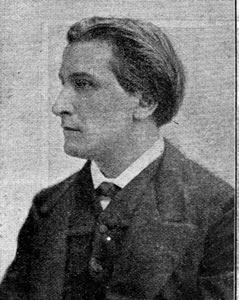
François Coppée (26 januari 1842 – 23 mei 1908)
De Franse schrijver Eugène Sue zou geboren zijn op 26 januari 1804. Zie voor meer informatie en een fragment mijn blog van 10 december 2006 en ook mijn blog van 26 januari 2007 en ook mijn blog van 26 januari 2009.
Uit: A Romance of the West Indies (Vertaald door Marian Longfellow)
„Toward the latter part of May, 1690, the three-masted schooner the Unicorn sailed from Rochelle for the island of Martinique.
A Captain Daniel commanded this vessel, which was armed with a dozen pieces of medium-sized ordnance, a defensive precaution necessary at that period. France was at that time at war with England, and the Spanish pirates would often cross to the windward of the Antilles, in spite of the frequent pursuit of filibusters.
Among the passengers of the Unicorn, few in number, was the Reverend Father Griffen, of the Order of the Preaching Brothers. He was returning to Martinique to resume his parish duties at Macouba, where he had occupied the curacy for some years to the satisfaction of the inhabitants and the slaves of that locality.
The exceptional life of the colonies, then almost continually in a state of open hostility against the English, the Spanish, and the natives of the Antilles, placed the priests of the latter in a peculiar position. They were called upon not only to preach, to hear confessions, to administer the sacraments to their flocks, but also to aid in defending themselves during the frequent inroads of their enemies of all nations and all colors.
The priest’s house was, as other habitations, alike isolated and exposed to deadly surprises. More than once had Father Griffen, assisted by his two slaves, intrenched himself securely behind a large gateway of mahogany, after having repulsed their assailants by a lively fire.
Formerly a professor of geometry and mathematics, and possessed of considerable theoretical knowledge of military architecture, Father Griffen had given most excellent advice to the successive governors of Martinique on the construction of works of defense.“
Eugène Sue (26 januari 1804 – 3 augustus 1857)
In het Musée Carnavalet
De Nederlandse dichter Jan van Hoogstraten werd geboren in Rotterdam op 26 januari 1662. Zie ook mijn blog van 26 januari 2008 en ook mijn blog van 26 januari 2009.
Snelle Tyd. Quid enim velocius aevo.
1.
Snelle tyden, ô hoe glyden
Onze dagen met u heen!
Wat wy jagen, wat wy myden,
Word door uwen loop vertreen.
Waar de zorg of schroom,
Vreugd of weelde toom,
Ons leven is gelyk een droom.
2.
Ongelukken, hoe ze drukken,
En bedroeven ’t zwaar gemoed,
Moeten voor ’t geluk weer bukken,
Als de voorspoed ons ontmoet.
Wat de tyd ons leert,
’t Zy ’t ons streeld of deerd:
Zy heeft het haast in rook verkeert.
3.
Zoo veel jaren, ons ontvaren;
Waar is onze Lentetyd,
Nu de zorgen ’t hart bezwaren,
’t Leven als een kleed verslyt.
Wat de Zomer zend,
Of de Winter schend,
De tyd dryft alles vlug ten end.
Jan van Hoogstraten (26 januari 1662 – 28 juli 1736)
De Franse dichteres en schrijfster Delphine Gay werd geboren op 26 januari 1804 in Aken. Zie ook mijn blog van 26 januari 2009.
Le Bonheur d’être belle
Quel bonheur d’etre belle, alors qu’on est aimée !
Autrefois de mes yeux je n’étais pas charmée ;
Je les croyais sans feu, sans douceur, sans regard ;
Je me trouvais jolie un moment par hasard.
Maintenant ma beauté me paraît admirable.
Je m’aime de lui plaire, et je me crois aimable…
Il le dit si souvent ! Je l’aime, et quand je vois
Ses yeux avec plaisir se reposer sur moi,
Au sentiment d’orgueil je ne suis point rebelle,
Je bénis mes parents de m’avoir fait si belle !
Et je rends grâce à Dieu, dont l’insigne bonté
Me fit le cœur aimant pour sentir ma beauté.
Mais… pourquoi dans mon cœur ces subites alarmes ?…
Si notre amour tous deux nous trompait sur mes charmes :
Si j’étais laide enfin ? Non… il s’y connaît mieux !
D’ailleurs pour m’admirer je ne veux que ses yeux !
Ainsi de mon bonheur jouissons sans mélange ;
Oui, je veux lui paraître aussi belle qu’un ange.
Apprêtons mes bijoux, ma guirlande de fleurs,
Mes gazes, mes rubans, et, parmi ces couleurs,
Choisissons avec art celle dont la nuance
Doit avec plus de goût, avec plus d’élégance,
Rehausser de mon front l’éclatante blancheur,
Sans pourtant de mon teint balancer la fraîcheur.
Mais je ne trouve plus la fleur qu’il m’a donnée ;
La voici : hâtons-nous, l’heure est déjà sonnée,
Bientôt il va venir ! bientôt il va me voir !
Comme, en me regardant, il sera beau ce soir !
Le voilà ! je l’entends, c’est sa voix amoureuse !
Quel bonheur d’être belle ! Oh !
que je suis heureuse !

Delphine Gay (26 januari 1804 – 29 juni 1855)
Portret door Louis Hersent
De Baskische schrijver en politicus Sabino de Arana y Goiri werd geboren op 26 januari 1865 in Bilbao. Sabino Arana Goiri werd de ideoloog van het Baskische nationalisme en stichter van de Baskische Nationalistische Partij. Hij bestudeerde de Baskische geschiedenis, taal en cultuur. Arana studeerde vijf jaar in Barcelona (1883-1888), om vervolgens naar Biskaje terug te keren om er zijn politieke missie te starten, wat culmineerde in de oprichting van de Eusko Alderdi Jeltzalea, de Baskische Nationalistische Partij in 1895. Hierin pleitte Arana voor herstel van de Fueros, de tot 1874 (Tweede Carlistische Oorlog) genoten privileges. Hij was overtuigd van een degeneratie van het Baskische ras ten gevolge van de aanzienlijke immigratie van Spaanse arbeiders. Arana was anti-socialistisch en antiliberaal. Zijn literaire werk bestaat uit 33 gedichten en liederen, waaronder de baskische nationale hymne Eusko Abendaren Ereserkia, 14 omvangrijkere literaire en politieke werken en meer dan 600 artikelen,
Eusko Abendaren Ereserkia
Lang leve Baskenland
glorie en glorie
voor de goede Heer van boven.
Er staat een eik in Biskaje
oud, sterk, gezond
zoals ook uw Wet
Op de boom vinden wij
het heilige kruis
ons symbool voor altijd
Zing “lang leve Baskenland”
glorie en glorie
voor de goede Heer van boven.
Sabino Arana Goiri (26 januari 1865 – 25 november 1903)










